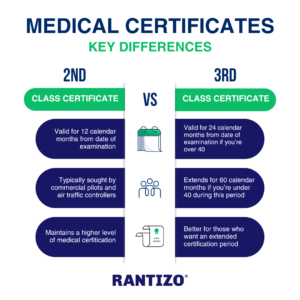RESOURCES
Understanding Airman Medical Certificates: What Drone Pilots Need to Know
When you’re in the pilot’s seat, it’s not just your skills and expertise that matter; your health plays a critical role too. That’s where Airman Medical Certificates come into play. These certificates are essential for all pilots and help ensure the safety of flight operations.
Many pilots often wonder about the differences between a 2nd Class and a 3rd Class Airman Medical Certificate. The truth is there’s just one significant distinction: the validity period.
- 2nd Class Certificate : This certificate remains valid for a period of 12 calendar months from the date of examination. It’s typically used by commercial pilots and air traffic controllers who need to maintain a higher level of medical certification.
- 3rd Class Certificate : If you’re over 40 years old, your 3rd Class Certificate will be valid for 24 calendar months from the date of examination. However, here’s where it gets interesting. If you’re under 40 during this period, your certificate extends for an impressive 60 calendar months! This means that if you’re 36 and obtain a 3rd Class Airman Medical Certificate, it will serve you well until your 40th birthday.

What’s important to note is that, regardless of the class, the restrictions concerning medications, background checks, and other criteria remain consistent. Your health and fitness to fly safely are paramount.
To dive deeper into the specific standards and requirements, you can explore the FAA Airman Medical Standards guide. Additionally, the FAA Medications Do Not Issue (DNI) and Do Not Fly (DNF) Lists provide valuable insights into medications that may affect your ability to fly.
So, whether you’re a seasoned pilot or someone dreaming of taking to the skies, understanding these differences in Airman Medical Certificates is key to ensuring you’re ready for a safer, smarter flight.
Have questions or want to learn more? Our team is available at support@rantizo.com or (319) 201-3020
The post Understanding Airman Medical Certificates: What Drone Pilots Need to Know appeared first on Rantizo.
share this
past blog posts
Related blogs





